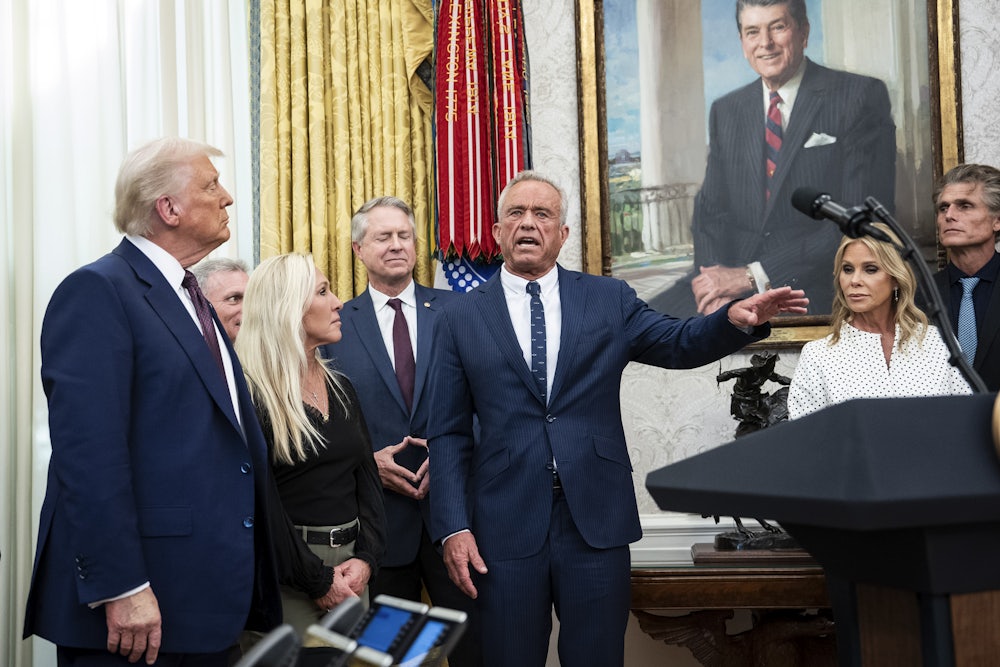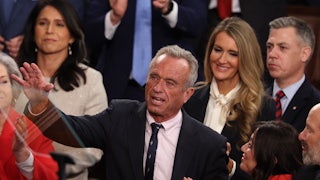It is a bleak time to practice public health in America. A leading purveyor of anti-vaccine misinformation, Robert F. Kennedy Jr., has been confirmed as the secretary of the Department of Health and Human Services, or HHS, which oversees some of the nation’s top health agencies, including the Food and Drug Administration, the Centers for Disease Control and Prevention, and the National Institutes of Health, or NIH. Over the past few weeks, these agencies have been thrown into chaos. NIH, in particular, has been impacted—the agency was already reeling with study sections being cancelled, grants being paused, and a 15 percent indirect grant rate being instituted (which would decimate university budgets) before this week’s news of massive staffing and budget cuts that, according to reports, “undermine decades of research.”
Many of these policies have either been reversed or halted by federal judges; but confusion and uncertainty persist in the public health world. At the same time, there are many Americans who find themselves elated, earnestly believing that RFK Jr.’s project of Making America Healthy Again can be a success. For those of us in public health, faced with the prospect of a dramatic roll back in recent public health successes, this has caused a real crisis in confidence—where do we go from here and how do we advance public health in America?
For some, the answer to the polarization around public health is to “depoliticize” it; by ensuring appropriate “viewpoint diversity.” This line of thinking holds that public health is dominated by progressives, which in turn alienates a subset of the American population. This supposed ideological dominance leaves the field vulnerable to the shifting political winds of the country; unable to assert expertise when dealing with right wing administrations and the health of the country suffering as a result.
But it is more the case that some conservatives have shifted to reject basic public health tenets than public health has somehow been ideologically captured by hardline progressives. After all, Donald Trump’s first administration did oversee the development of the Covid-19 vaccines under Operation Warp Speed and George W. Bush’s administration created the spectacularly successful global health AIDS funding program, PEPFAR.
The fundamental principle behind public health is that everyone’s health is improved when collective investments are made to make society safer; interventions made “upstream” that are preventative are better than relying on treatment of illness alone. It’s much better to clean the contaminated water supply that is giving people cholera than to treat everyone who gets cholera. Public health research broadly has proven the benefits of these investments or the pitfalls of their absence—private equity taking over healthcare systems leads to worse outcomes; Medicaid expansion leads to better outcomes, and the U.S. does worse on comparative measures of health with our European counterparts due to a lack of a social safety net. Bowing to the difficulty of the U.S. political environment, if you crack open a public health journal today, much of the research is focused on evaluating outcomes of existing programs or suggesting minor changes to programs and policies that may result in improvements. There are comparatively fewer discussions on, say, the urgency for Medicare For All.
Like it or not, public health is politicized, but public health practitioners are not prepared to move like political actors. Trump was catapulted into power through a wave of anti-institutionalism. Broadly speaking, people feel like things are not working—they pay more for groceries while recalls and bird flu outbreaks make the news. They must jump through hoops for health insurance coverage (as evidenced by the anger people expressed towards UnitedHealthcare in December). The last few years have been dominated by natural and chemical disasters that poison the air and water, from East Palestine to Los Angeles. It is no wonder that people feel like America needs to be “made healthy again.”
So how should we respond to this sentiment? We can take some cues from labor organizers.
The late organizer Jane McAlevey, author of the books No Shortcuts: Organizing for Power in the New Gilded Age recounted a story about organizing nurses at Jefferson Einstein Philadelphia Hospital in Philadelphia. After a successful, hard-fought union campaign, in which organizers had to face down a fierce campaign against their efforts, the union now had to get strike-ready to win a contract. McAlevey says that success depended on earning the support of a department that voted against the union—and specifically winning over one particular nurse in that department who was an influential workplace leader and vocally anti-union. The process was rough-going: The first few conversations with that nurse were met with indifference and sometimes hostility. But persistent attempts at rapprochement eventually paid off. When all was said and done, this nurse ended being a major leader in the campaign to win a contract.
The larger point to McAlevey’s story is that to advance the labor movement in America, the movement has to organize workplaces and in order to do this, organizers have to be willing to have hard conversations. That doesn’t mean that we concede ourselves to the points of people who don’t agree, nor does it mean that we condescend and belittle opposing arguments; rather, much like the workers of Jefferson Einstein, we commit to talking and listening until we make inroads.
Public health workers did this during the early stages of the Covid-19 vaccination program. Across the country, community health workers did faith-based outreach, outreach to farmworkers and other workers, communicated in different languages, went to community housing projects, and staffed pop-up vaccination sites. All of this relied on a network of trusted community leaders and institutions. The anti-vaccine sentiment that erupted in the years since reflects the inability to scale up these efforts – they were always limited in nature, and within months, vaccination became primarily the responsibility of the pharmacies.
With anti-vaccine sentiment spreading and the potential advent of those talking points being repeated by the HHS secretary, local health departments need to again engage in this type of outreach; particularly as vaccination rates begin to decline, causing outbreaks of preventable disease. We shouldn’t go where there is dangerous hostility, but there are a lot of people that can be reached who are vulnerable to vaccine skepticism. We face an uphill battle against online platforms with few protections against misinformation, but there is no way through but to meet people where they are.
Then, of course, there are the political threats to public health. In the aftermath of the pandemic, many local and state governments moved to pass measures that would restrict the authority of public health officials. Even Democratic politicians are not immune from this tendency, with some politicians talking up mask bans despite being roundly opposed by the public health community. These are daunting challenges, but once again, getting organized locally and identifying allies cannot only provide meaningful opposition to any of these measures, but can also be used to push forward policies that improve the public’s health rather than just being on the defensive. The more public health engages in public education, the more the public can also be mobilized for these ends.
As public health, and public service more broadly, are slowly dismantled, there’s a tendency to say that nothing can be done, that this is what the public voted for, so this is what they must deal with—as they say online, Trump voters are in their “fuck around and find out” era. This type of thinking treats the public’s thinking as automatic – it assumes that there will be a backlash to these measures, thus propelling another party into power to reverse them. While this may yet play out in this fashion, it would be irresponsible to simple take this as a given. Without robust public outreach, education and mobilization paving the roads of this political change, it’s just as likely that these reversals remain permanent. Besides that, as public health practitioners, our allegiance is to the public, no matter how they voted–which demands an ongoing defense of public health whether the administration is red or blue.










